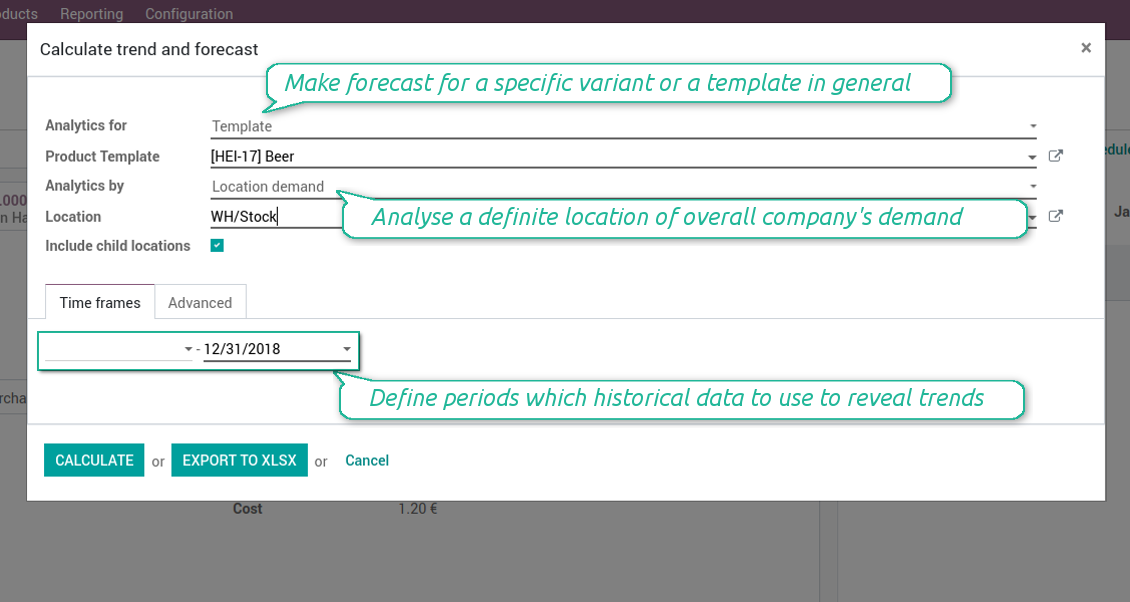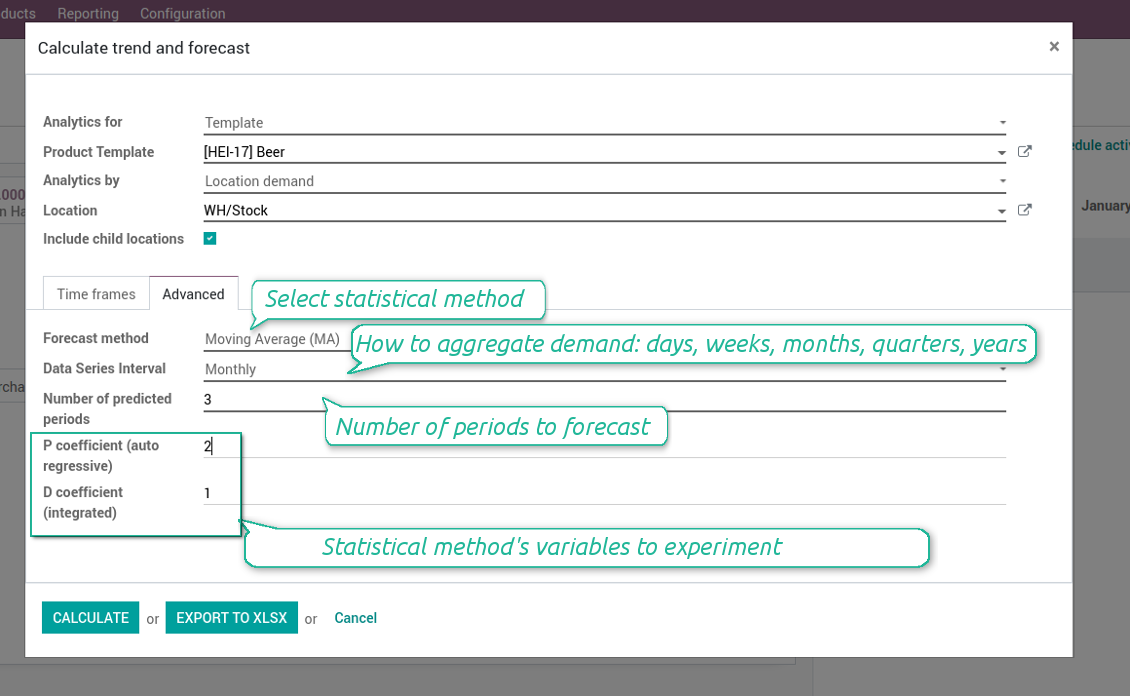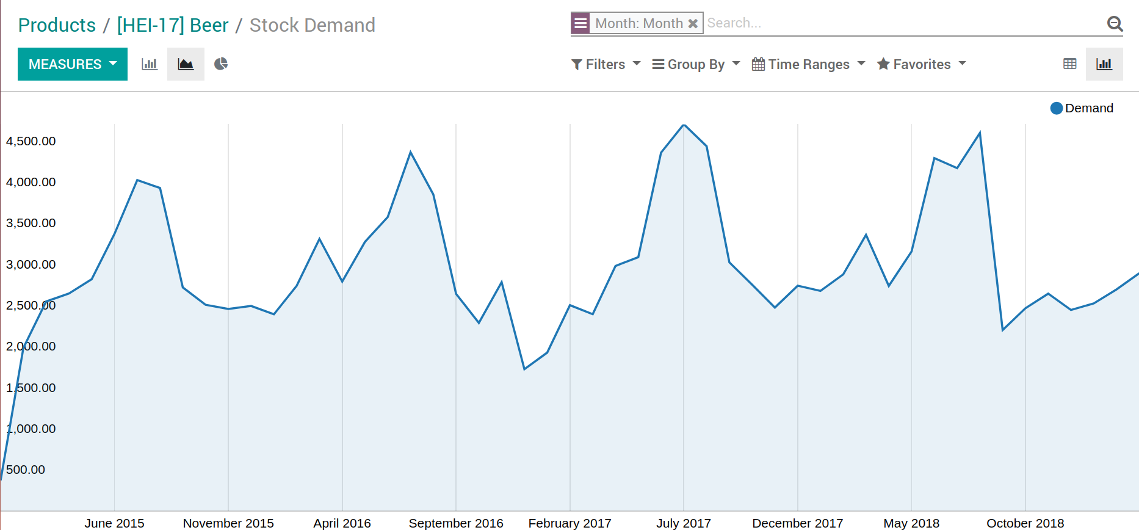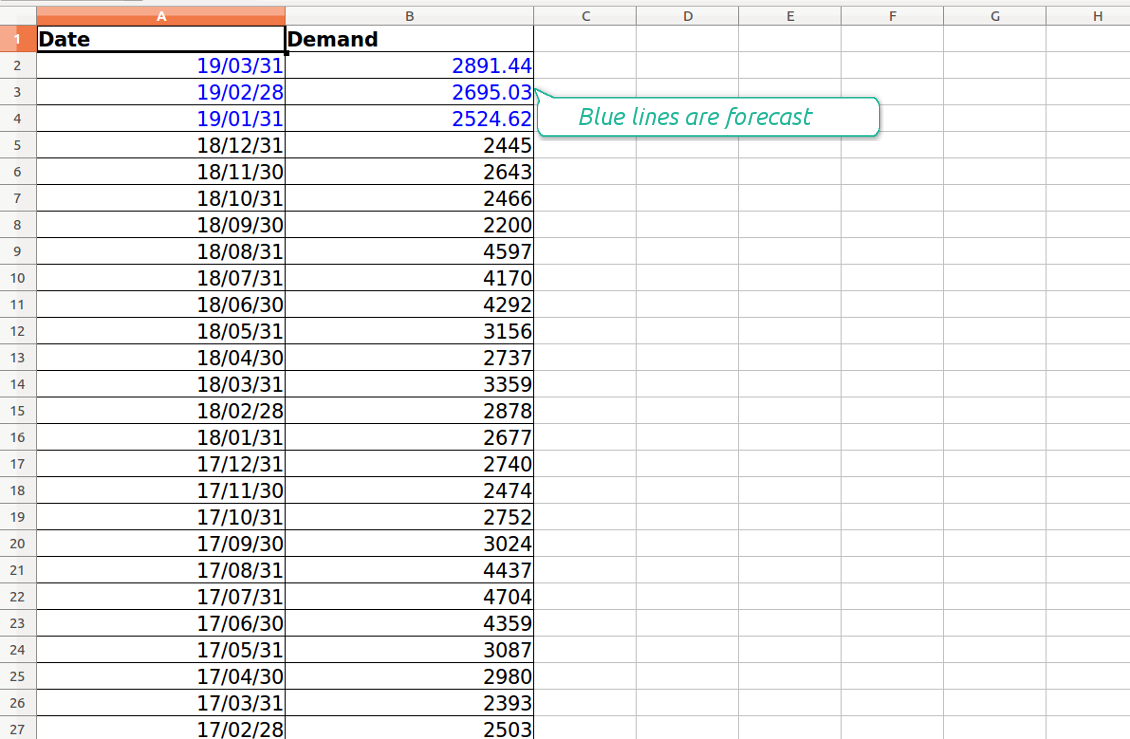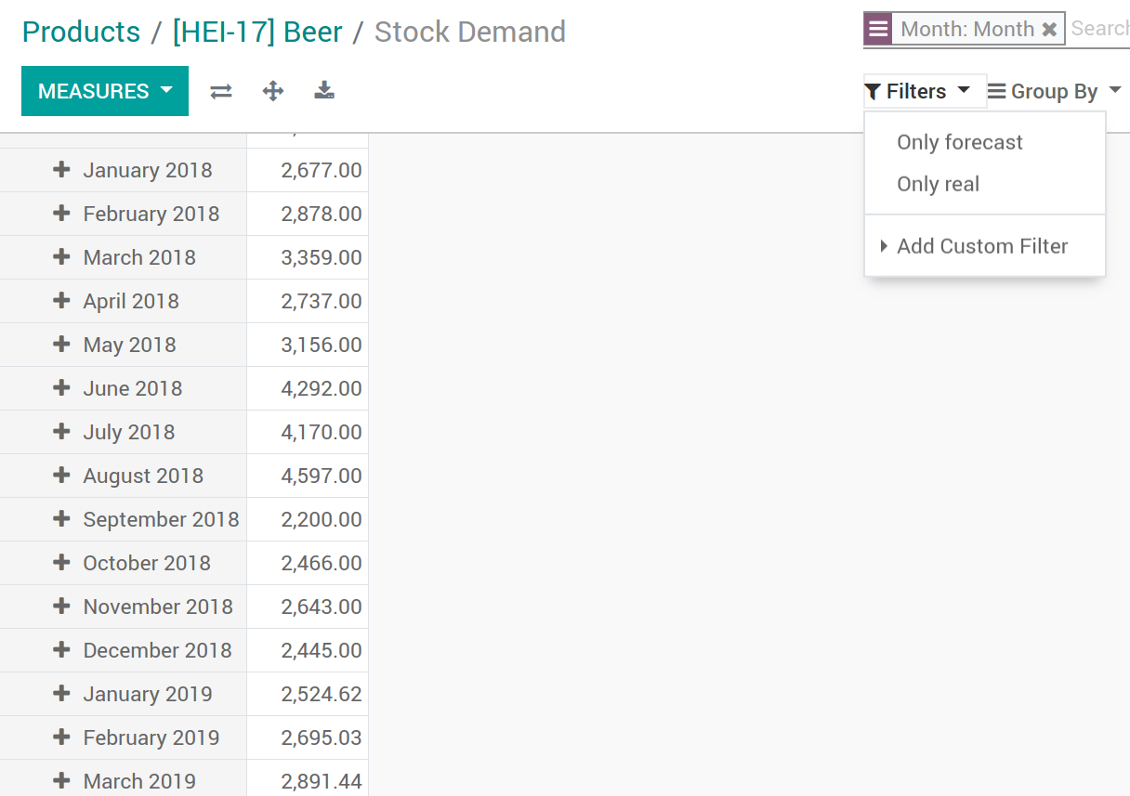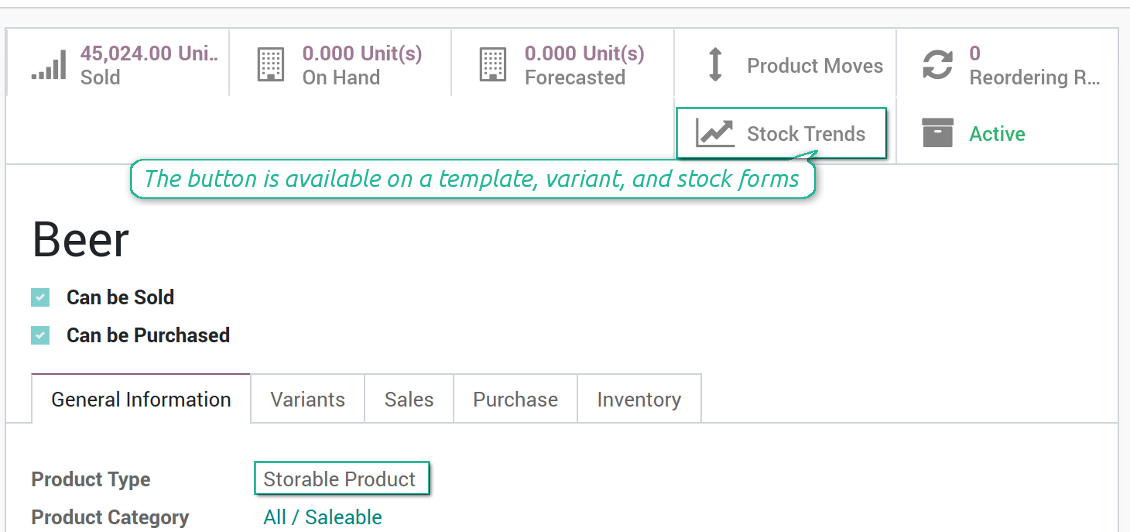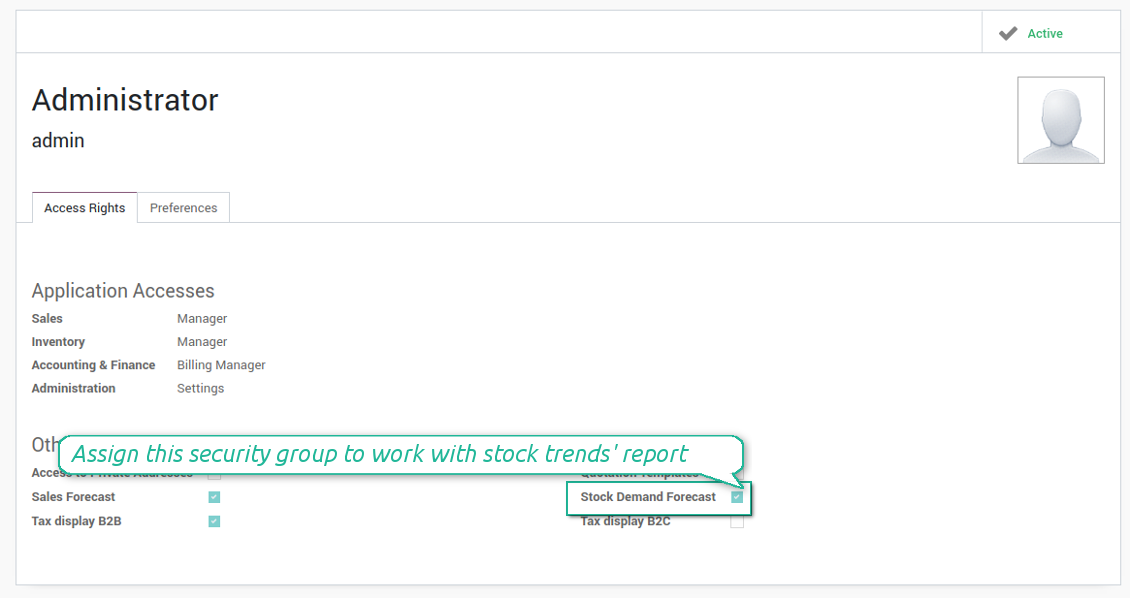Stock Demand Trends and Forecast v.11
The tool to calculate stock demand trends and make prediction for future demand statistically. Stock Forecast
Demand trends and forecast are shown in comfortable manner of your choice: as an Odoo chart, as an Odoo report (pivot), as an Excel table. The latter might be also used to import data in certain statistical software
Apply the statistical method which you consider as the most suitable: Autoregression, Moving Average, Autoregressive Integrated Moving average, Seasonal Autoregressive Integrated Moving Average, Simple Exponential Smoothing, Holt Winter’s Exponential Smoothing. Look at the section Statistical methods for forecast
Demand trends and forecast are constructed for product templates in general (e.g. all iPads) or specific product variants (iPad 32Gb). Use the button 'Stock Trends' on a product form for that purpose. The product under analysis should be storable
Make analysis per the whole company or per a definite location. In the latter case optionally include or exclude child locations
Stock demand is calculated as all done stock moves for this period which source location is one of internal location under consideration and which destination location is not of this range
Apply time frames of historical data which is used as an analytic basis. Forecast periods are ones which follow after the end of defined frame. In such a way you make check statistical reliability 'predicting' actually passed intervals
Forecast as many intervals as you like, but remember that prediction for the next 10 years would be hardly reliable
Based on your historical data and applied coefficients, sometimes Odoo is not able to reveal trends and make forecasts. In that case only historical data would be shown in reports. But even historical trends might have analytical use
Grant the right for trends analysis for any WMS user, but be cautious: all stock moves of a current company will be under consideration
Autoregression (AutoReg)
It is the simplest but still widely used statistical method for time series forecast.
Autoregressive Distributed Lag (ARDR)
The moving average method takes into account 'errors' in previous observations.
The autoregressive moving average method is a combination of both AR and MA methods. To apply the ARMA method use the MA method with auto regression coefficient (P coefficient) as 2
Autoregressive Integrated Moving Average (ARIMA)
The method which also combines the methods AR and MA, but also tries to make data stationary. It is appropriate to use for historical data with pure trend but without seasonal changes.
Seasonal Autoregressive Integrated Moving-Average (SARIMA)
The SARIMA method enriches the ARIMA method with considering seasonal changes. It is one of the most complex and wide spread methods utilized for forecasting time series now
Simple Exponential Smoothing (SES)
The SES model usage is similar to the AR method, but instead of relying upon linear function, it exploits exponential one
Holt Winter’s Exponential Smoothing (HWES)
The HWES method enriches the SES method to work with time series trends and seasonal effects.
When this tool should be used
- You have enough historical stock demand data (per location or company), since it is senseless to make forecast based on last 5 days of operations
- Stock demand is regular and is not chaotic, meaning that your decisions do not have 100% impact and there is at least some correlation between market demand and your WMS operations
- You have some seasonal and from period to period trends, which you noticed but can't fully analyse
Python dependencies
To guarantee tool correct work you would need a number of Python libraries: pandas, numpy, statsmodels, scipy, xlsxwriter. To install those packages execute the command:
pip3 install pandas numpy statsmodels scipy xlsxwriter
If you run Odoo on Python prior or equal to version 3.7, please install the following versions of the packages pandas==1.3.5, statsmodels==0.13.1
Default values
Demand trends and forecast configuration
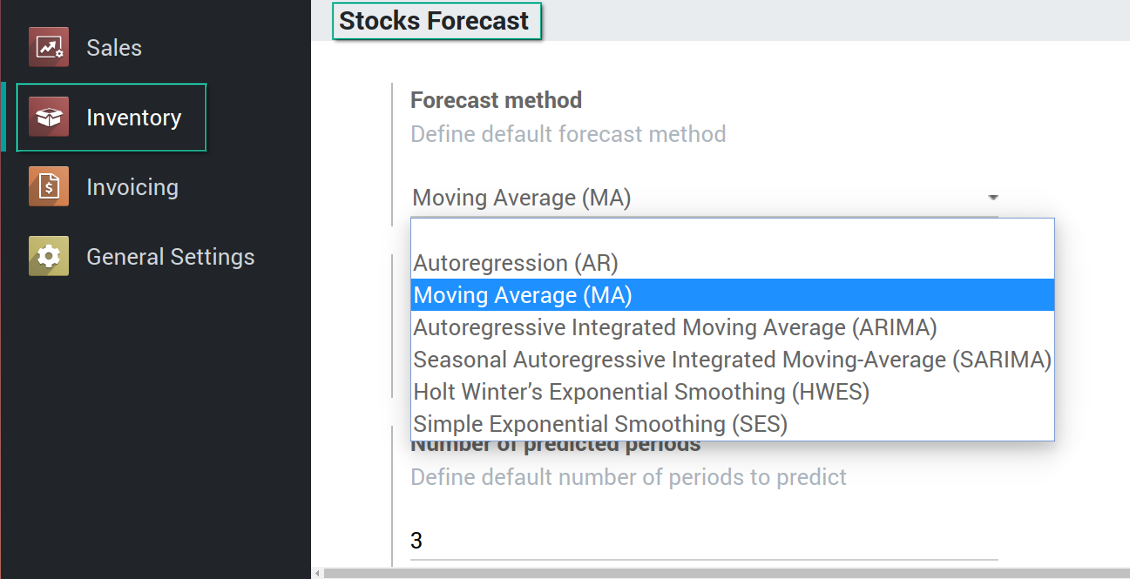
Bug reporting
If you encounter bugs or inconsistent behavior, do not hesitate to contact us. We guarantee to provide fixes within 60 days of purchase and are intensely interested in improving our tools even after this period.
You do not need a phone number or credit card to contact us. You should only pass a short email sign-up, which does not take more than 30 seconds.
Please include as many details as possible in your request: screenshots, Odoo server logs, a full description of how to reproduce your problem, and so on. Usually, it takes a few business days to prepare a working plan for an issue (if a bug is confirmed) or provide you with guidelines on what should be done (otherwise).
Public features requests and module ideas (free development)
We are strongly motivated to improve our tools and would be grateful for any feedback. If your requirements are of public use and might be efficiently implemented, the team will include those in our to-do list.
Such a to-do list is processed regularly and does not assume extra fees. Although we cannot promise deadlines and final design, it might be a good way to get desired features without investments and risks.
You do not need a phone number or credit card to contact us. You should only pass a short email sign-up, which does not take more than 30 seconds.
The technical core to synchronize your cloud storage solution with Odoo
The tool to build deep and structured knowledge base for internal and external use. Knowledge System. KMS
The tool for time-based service management from booking appointments to sales and reviews
The tool to set up KPI targets and control their fulfillment by periods. KPI dashboards. Dashboard designer. KPI charts
The tool to automatically synchronize Odoo attachments with OneDrive files in both ways
The tool to automatically synchronize Odoo attachments with Google Drive files in both ways
The tool to configure variant prices based on attributes coefficients and surpluses
88€